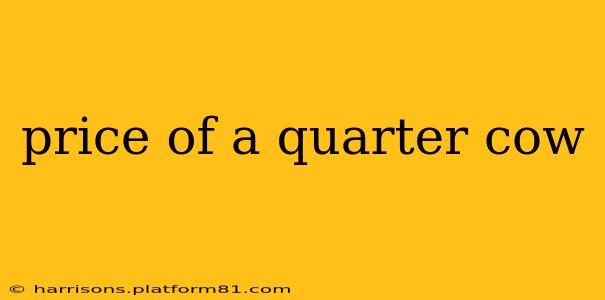Buying a quarter cow, or a share of a cow, is becoming increasingly popular as a way to access affordable, high-quality meat. However, the price can vary significantly depending on several factors. This guide will break down the cost, helping you understand what influences the final price and what to expect.
What Factors Determine the Price of a Quarter Cow?
Several key factors influence the overall cost of purchasing a quarter of a cow:
-
Breed of Cow: Certain breeds are known for their superior meat quality, which can command higher prices. Angus beef, for instance, is often more expensive than other breeds due to its marbling and tenderness. Consider the breed's characteristics and your preferences when budgeting.
-
Weight of the Cow: A larger cow naturally yields more meat, resulting in a higher overall cost. However, the price per pound might be slightly lower due to economies of scale. You'll usually purchase a share based on the live weight of the cow, before processing.
-
Processing Fees: These fees cover the butchering, cutting, wrapping, and freezing of the meat. Processing costs vary considerably depending on the butcher's location, services offered (e.g., custom cuts), and the amount of meat being processed.
-
Location: Geographical location significantly affects the cost. Rural areas may offer lower prices compared to urban centers due to lower overhead costs for ranchers and butchers.
-
Delivery Costs: If the rancher doesn't offer delivery, you'll need to factor in transportation costs to get your share of the meat home. This can be a considerable expense, particularly if you live far from the processing facility.
-
Additional Services: Some ranchers offer additional services such as custom cuts or vacuum sealing, which will increase the total cost.
How Much Does a Quarter Cow Typically Cost?
Giving a precise price for a quarter cow is difficult because of the variables listed above. However, a reasonable estimate for the cost of a quarter cow before processing would range from $1,000 to $2,500 or more, depending on the factors mentioned. Adding processing fees of $0.50-$2.00 per pound and delivery costs can easily bring the final cost to $1,500-$3,500 or more. Remember, this is just a broad estimate.
What's Included in a Quarter Cow Share?
A quarter cow share typically includes approximately 1/4 of the total weight of the cow after processing. This means you'll receive a variety of cuts, including:
- Steaks (ribeye, sirloin, T-bone, etc.)
- Roasts (chuck roast, bottom round roast, etc.)
- Ground beef
- Stew meat
- Other cuts like short ribs or brisket
The exact cuts and quantities you receive will depend on the cow's size and the butcher's cutting practices.
What Are the Benefits of Buying a Quarter Cow?
Buying a quarter cow offers several advantages:
-
Cost Savings (potentially): While the upfront cost can seem high, it can be more economical in the long run than buying retail cuts of meat, particularly higher-quality cuts.
-
High-Quality Meat: You'll have access to higher-quality, often grass-fed or pasture-raised meat, depending on the rancher's practices.
-
Knowing Your Source: You'll have a clear understanding of where your meat comes from and how the animals were raised.
-
Food Security: In times of economic uncertainty or supply chain disruptions, having a readily available supply of meat can offer peace of mind.
How Can I Find a Local Rancher Selling Quarter Cows?
Finding a local rancher can be done in a few ways:
- Farmers' Markets: Check local farmers' markets for ranchers who sell shares of beef.
- Online Search: Search online for "buy a quarter cow [your location]"
- Local Farm Organizations: Contact local farm organizations or agricultural extensions for recommendations.
Buying a quarter cow can be a rewarding experience, providing high-quality meat at a potentially competitive price. However, thorough research and careful planning are essential to ensure you get the best value and meet your needs. Remember to factor in all costs, including processing and transportation, before making your decision.
